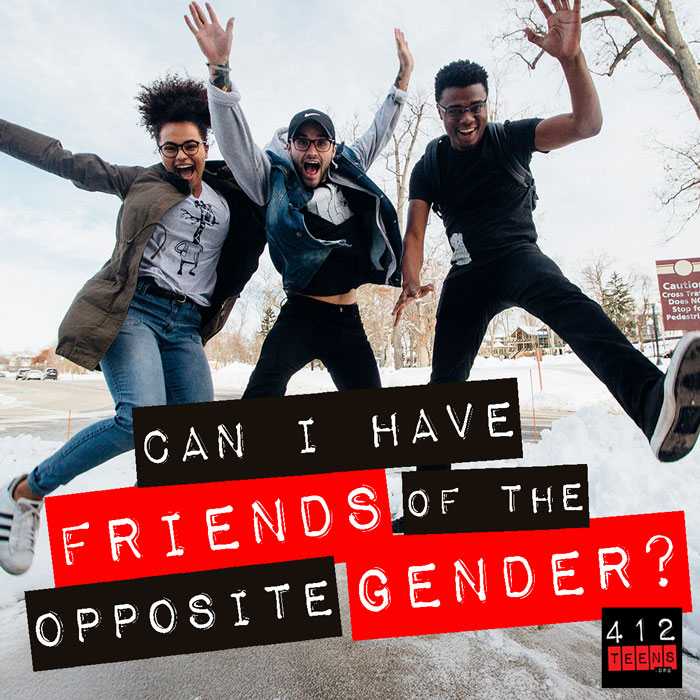Can Christian teens have friends of the opposite gender?

Yes, Christian teens (and adults) can have friends of the opposite gender. But, like so many things in life, it's not necessarily a black and white, "blanket answer" kind of deal. True friendships are awesome and an important part of living life, seeing the world from other perspectives, and developing empathy. And for friendships to be healthy, we need to take responsibility for how we treat our friends by interacting with them in a godly way.
Just because the world expects teenagers to be reckless in their relationships, that doesn't mean we have to conform to those expectations. Romans 12:2 (NLT) says, "Don't copy the behavior and customs of this world, but let God transform you into a new person by changing the way you think. Then you will learn to know God's will for you, which is good and pleasing and perfect."
Honoring God in Our Friendships
As followers of Christ, we ought to glorify and honor God in everything we do (1 Corinthians 10:31), including how we conduct our relationships—whether with family or friends, in the workplace, or with a romantic partner. God made us to have relationships with each other, to connect, encourage, and build one another up in love (Hebrews 10:24-25). Non-sexualized relationships with others (of all types!) is essential in building healthy communities and friendships. Friendships can be an amazing part of life that help us grow emotionally, socially, and spiritually.
Proverbs 18:24 tells us that one good friend is better than many acquaintances. Proverbs 27:17 says that friends in healthy relationships will make each other better people. Ecclesiastes 4:9-10 reminds us that friends are here to help each other.
Friendship with the Opposite Gender is NOT Sinful
It's important to know that having friends of the opposite gender is NOT wrong or sinful. If you've grown up in a very strict or spiritually abusive church or religious family environment, you may have been taught that opposite gender friendships are off limits or that guys and girls aren't allowed to have close friendships. But the truth is, the Bible does NOT forbid these friendships—it just gives us wisdom for handling relationships in a way that's respectful and honors God.
Believers are a part of God's family (Ephesians 2:19), and God calls us to have healthy, meaningful relationships with each other. We love one another by loving God and loving each other as brothers and sisters in Christ (1 Timothy 5:1-2). Married or single, male or female, older than you or younger—believers are called to have relationships that reflect Christ to the world by our love for one another (John 13:35).
If you find yourself feeling pressured by people who have strict or legalistic views, remember that your spiritual journey is between you and God alone. Developing biblical convictions that work for us is good and right, but not everyone's convictions will be the same. What matters most is that you're honoring God with your heart and actions (Colossians 3:17).
Guarding Your Heart
Of course, we have to acknowledge that having friendships with the opposite gender as a teenager can be very confusing at times. Emotions can shift, hormones happen, and what started as a casual friendship might turn into a crush—or maybe something deeper. And that's OK! There's nothing wrong with having emotions; God made us have feelings for a reason.
But even though our emotions can be helpful in some situations, in other circumstances, they aren't always trustworthy. So we need to rely on our logical brains as well as guidance from the Holy Spirit (John 14:26). Proverbs 4:23 says to "guard your heart, for everything you do flows from it." This means we need to be wise and pay attention to how our friendships affect us emotionally, spiritually, and even physically.
Paying attention to our own hearts is also a way to protect and respect our friends. If you or your friend starts feeling like the relationship is becoming more than a friendship, it's important to talk about it honestly. Please know that those feelings are not automatically wrong. After all, the best marriages begin with deep friendships. But the timing may not be right, or the feelings may not be mutual.
If you feel like your friendship is turning into something more, it's OK to discuss it. If one or both of you doesn't feel the same and/or doesn't feel ready to date, don't be afraid to set (and respect) boundaries if needed. Real love, whether it's in friendship or dating, always respects and honors the other person (Romans 12:10).
Freedom & Responsibility
The Bible doesn't have "rules" about friendship with the opposite gender. Instead, God has given us principles that help us make wise choices in how we interact with others. Galatians 5:13 (NLT) says, "For you have been called to live in freedom, my brothers and sisters. But don't use your freedom to satisfy your sinful nature. Instead, use your freedom to serve one another in love."
Because of Jesus, we have been given great freedom from the fear of condemnation (Romans 8:1-2), and it's our responsibility to use that freedom wisely—not as an excuse to sin. We were not set free so that we could do whatever unhealthy, selfish things we desire (Romans 6). Rather, we were granted freedom so that we can live a godly life full of joy, love, and purpose—without having to fear for our eternal security.

This means that we think before we act or speak (Proverbs 16:23). That we don't let our anger speak for us (James 1:19). That we consider how our actions impact others (Romans 14:13-23). That we prioritize righteousness, faith, love, and peace over satisfying lustful passions (2 Timothy 2:22).
Healthy Friendships are Respectful
Some people may have personal convictions about not getting too close with friends of the opposite gender, and that's OK too. When it comes to personal convictions, Romans 14:5 says, "Each one should be fully convinced in their own mind." So if you or your friend have set certain boundaries about friendship with the opposite gender, that's something to respect. Likewise, if your parents (or your friend's parents) have set certain boundaries; it's important to respect their house rules as long as you are living under their authority (Ephesians 6:1-3).
Respecting others' boundaries is a huge way to show them love and keep your relationships healthy. Being wise in how you interact with others helps keep YOU emotionally and spiritually healthy too.
"Put on then, as God's chosen ones, holy and beloved, compassionate hearts, kindness, humility, meekness, and patience, bearing with one another and, if one has a complaint against another, forgiving each other; as the Lord has forgiven you, so you also must forgive. And above all these put on love, which binds everything together in perfect harmony. And let the peace of Christ rule in your hearts, to which indeed you were called in one body. And be thankful." —Colossians 3:12-15
So, yes, Christian teens can have friends of the opposite gender while using wisdom, balance, and respect. Be honest with yourself, communicate clearly, and set (and respect) boundaries when needed. Friendships can be a beautiful way to grow, learn, and share God's love with one another. Approach all relationships with respect for yourself, the other person, and your relationship with God, and you will be able to enjoy rich, meaningful interactions with all kinds of people.
ALSO SEE:
- What is true friendship?
- What is love?
- What does it mean to guard your heart?
- What does the Bible say about having a crush?
- How do I control my hormonal emotions?
- How can I control my hormones and sexual urges?
- When Friendships End
- When Friends Reject Your Faith
- Can I be friends with non-Christians?
- Are non-Christian friends "bad company"?
- How should I treat someone who is transgender?
- When Christians Have Different Convictions
- What does the Bible say about respecting your parents?
- When Your Friends Leave
- What should I do if I'm crushing on a non-Christian?
- ISO: A BFF
- How can I treat women with more respect?


TL;DR
Having friends of the opposite gender is NOT wrong or sinful. Believers are a part of God's family (Ephesians 2:19), and God calls us to have meaningful relationships with each other. We love one another by loving God and loving each other as brothers and sisters in Christ (1 Timothy 5:1-2). Married or single, male or female, believers are called to have relationships—same sex and opposite sex—that reflect Christ to the world by our love for one another (John 13:35). Approach all relationships with respect for yourself, the other person, and your relationship with God, and you will be able to enjoy rich, meaningful interactions with all kinds of people.

Writer & Managing Editor: Catiana (Cat)
Cat is the web producer and managing editor of 412teens.org. She is known as "412teens" on the 412teens Discord. She loves audiobooks, feeding the people she cares about, and using Christmas lights to illuminate a room. When Cat is not cooking, gardening, or practicing creativity, she enjoys spending time with her two adult kids, six socially-awkward cats, and her amazing friend-amily.
